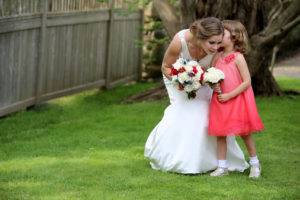At 28 years old I was widowed, and at 32 I remarried. If I had a dime for every person who told me I would “rebound” back in my first year of widowhood, I would be able to pay off my car loan. This would go under the category of what-not-to-say-to-a-widow.
As I started dating again and eventually found a man who made the world seem a little less scary and reignited my excitement to live, we ended up getting married. However, with being remarried, I received a lot of messages of congratulations on “moving on.”
When you hear something so many times, you begin to believe it. But the morning after my wedding, I still thought about my dead husband while laying next to my new husband. And then the next day and weeks and months afterward, I still think about George. He doesn’t get erased. My memories don’t become null and void. I remember the pain vividly, and my mind easily travels back to the days leading up to his last breath. He’s always one thought away, and the memories don’t disappear or get removed because I’m remarried.
This parallels a mother who loses a newborn and decides to get pregnant again years later. Her second child doesn’t replace the one she lost. What it does is it forces her to love and care for her second child differently. It makes her appreciate all the firsts so much more.
With being remarried, I love my current husband on a deeper level than I did George. Which I hate to admit, but it’s true. It doesn’t mean I love him more. It means I love him differently. And it would be dishonest of me not to say it.
I love my current husband so deeply because of my loss. And to experience buying a house with him, discussing whether to have children and even celebrating the holidays as a married couple are all life events I never had a chance to do with George. Although these experiences seem trite, I mourned them when he died because I’d never had the opportunity to do it.
Throughout the year my grief has been triggered more, and I don’t feel as if I’ve “moved on.” I’m not mourning the loss anymore, and have accepted he’s gone. However, all these life experiences are out of the ordinary for me. If you think about it, I was married for less than a year, and instead of planning a Thanksgiving dinner or arguing who’s family to spend the holidays with, I was planning a funeral.
My grief is morphing into something unexpected as all these new life experiences happen. I’m walking toward something I’ve always wanted, and dreamed about, but convinced myself it wouldn’t happen because I lost everything five years ago.
My grief this year has reawakened because I carry many characteristics I’m not proud of and have always excused. When it came time to register my car in my new name, I nearly had an eruption at the DMV which would’ve been as devastating as Mount Vesuvius. When under a little bit of uncomfortable pressure, I can’t contain my anger. And during the first couple of years without George, I felt so out of control, but I made excuses.
“I’m pissed off because my husband died.”
“I’m a widow, that’s why I feel this way.”
“Have you ever tried watching someone you love die in front of you?”
To feel the uncontrollable anger, it exposed a characteristic I’ve made excuses for, for a long time. But what it does show me are areas of personal development I need to work on, that are results of grief being left untamed.
When it comes to attitude, I control it. Some influences can be harmful, and when I travel down the rabbit hole of negativity and blaming my flaws on grief, it prevents me from growing. Almost five years after he died, I justify my feelings with, “I’m sad because I’m losing my identity.” But the reality is my name doesn’t change who I am as a person. And damnit, those 9th grade Romeo and Juliet lessons I wish kicked in before heading into the DMV that day, because “a rose by any other name would smell as sweet.”
My grief this year is forcing me to change, yet again. The hardest aspect about expecting to have “moved on,” is the inability to explain that I’m not done grieving. And I’m not sure there is a real finality to grief. Which makes me believe that the acceptance phase of grief, is understanding there is no remedy for a broken heart. I’ll continue to live, but I will remember and honor the man who taught me how to love. I’ll squeeze my new husband extra tight throughout the holidays because the fear of loss will always lurk.


